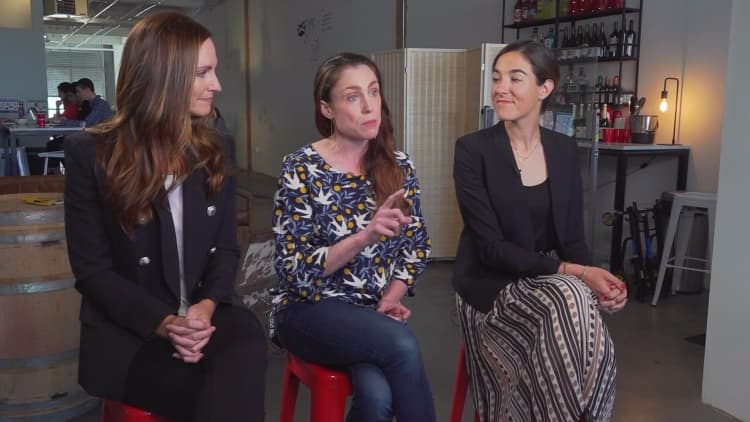Silicon Valley is still under fire for its lack of diversity. At tech giants like Apple and Google, women still comprise less than a third of employees, and female founders drew just 2 percent of VC dollars last year.
One group of female angel investors is working on a plan they hope will help close those gaps by honing in on the nexus of power: the allocation of shares to founding employees of startups. This investing collective of six former Twitter executives, called #Angels, says that if more women have representation on the cap table — the legal document that lays out equity stakes in a company — that will help boost female leadership and wealth creation, and turn more women into VC investors who can back women-run startups. #Angels is focused on educating women and men alike on the value of bringing in female executives early and giving them shares.
"There's four groups of people who make significant wealth and who are on the cap table. It's founders, it's early executives, it's early employees and it's investors," says Chloe Sladden, one of the #Angels. "We know that women and underrepresented minorities do not make up those groups significantly. So our concern is if women and underrepresented minorities are not part of the cap table, they are not part of the wealth and power that shapes Silicon Valley."
#Angels co-founder Jessica Verrilli, also a partner at VC fund GV says, "If we are able to get women and underrepresented minorities building wealth in Silicon Valley through ownership of the cap table, I think we are going to see that same group of people starting VC firms, more of them having the financial resources to bootstrap a company and take risk, having bigger platforms to influence not just our industry but increasingly the entire world."
Houseparty COO Sima Sistani was an executive at Yahoo's Tumblr, pregnant with her second child, when she was approached by Sladden about joining the video chat app startup as a co-founder.
"There's a prototype here of the startup founder being young, white, male, who is giving up their entire life, subsisting on ramen noodles, and building empires," Sistani says. "Unfortunately that didn't look like me."
Sladden convinced her to leave her stable job and take the leap to a startup in exchange for a piece of the company's equity. "The nice thing about Chloe was that she's coming from a similar standpoint as me, but she could also see my potential so she was able to advise me that, 'I think you can do this' and empower my decision-making in that moment to take a risk."
Sladden and the #Angels collective have invested in more than 60 companies over three years. They talk to each of their founders about the importance of attracting top female employees with equity and the value of having a diversity of perspectives in the room from the beginning. They've also hosted dozens of events for a network of hundreds of women in tech, many in partnership with VC funds like Sequoia, Social Capital and Kleiner Perkins.
And they coach women on a range of topics, from how to break into a deal to the importance of getting a place on the cap table.
If women and underrepresented minorities are not part of the cap table, they are not part of the wealth and power that shapes Silicon Valley.Chloe Sladdenangel investor
"You might understand what salary you should receive based off previous jobs you've had," says another #Angel, Jana Messerschmidt. "When you negotiate for equity there's no real road map to understand how you can value the equity, how much growth a company is going to have, and so we think that in general it's been harder for women and underrepresented minorities to negotiate as well for the equity piece."
First Round Capital partner Phin Barnes was the first VC to co-host a dinner with the group. Now they co-host an angel investing bootcamp, and has invested with them on a number of companies, including Modern Fertility, Wifi company Ero, and Biotech company Lygos.
"Their networks tended to be majority female and equally amazing to any other network that we could tap into," says Barnes. "So it really helped us to be able to bring the diversity of their networks into our community at First Round."
And ultimately, getting those network into senior positions can have a multiplier effect. Sistani has prioritized diversity in her hiring, and had a 50/50 gender split in her company's crucial early stage.
"Those early women who were here have not only helped define our culture and our product and organization," says Sistani, "but they will also be part of the wealth creation one day should we exit."
Like this story? Like CNBC Make It on Facebook!
Don't miss:
Octavia Spencer: Jessica Chastain helped me get 5 times the salary I asked for




